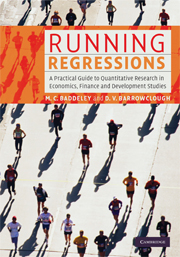 Running Regressions
Running Regressions Book contents
- Frontmatter
- Contents
- List of figures
- List of tables
- List of boxes
- Acknowledgements
- List of acronyms
- How to use this book
- Part I Simple regression and data analysis
- 1 An introduction to Ordinary Least Squares
- 2 Running simple regressions
- 3 Using logs and estimating elasticities
- 4 Hypothesis testing
- Part II Multiple regression and diagnostic testing
- Part III Time-series econometrics
- Part IV Advanced topics
- Index
- References
4 - Hypothesis testing
Health expenditure and the quality of life
Published online by Cambridge University Press: 05 June 2014
- Frontmatter
- Contents
- List of figures
- List of tables
- List of boxes
- Acknowledgements
- List of acronyms
- How to use this book
- Part I Simple regression and data analysis
- 1 An introduction to Ordinary Least Squares
- 2 Running simple regressions
- 3 Using logs and estimating elasticities
- 4 Hypothesis testing
- Part II Multiple regression and diagnostic testing
- Part III Time-series econometrics
- Part IV Advanced topics
- Index
- References
Summary
Economic issues include:
Public goods and externalities
Asymmetric information and adverse selection
Econometric issues include:
Hypothesis testing: using p values
The F test of explanatory power
Data issues include:
Household survey data
Qualitative indexes
The issue
How much should the State spend on health? One might doubt this is a question for economists – perhaps medical professionals should decide on patients' needs and treatment costs or politicians should be asked about the desires of the electorate and its taxpayers. But economists can offer helpful tools with which to debate questions of this nature. No country has a blank chequebook, and public budgeting is a tense business of allocating scarce resources amongst competing needs. Economists can contribute helpfully to the debate on how resources might be best used by showing the relative costs and benefits of different strategies. This can help to reconcile, or at least to prioritise, diverse and sometimes conflicting objectives. Moreover, the question of how much governments should spend on health care is usually nested within the wider debate to which economists have long been central – namely, to what extent should the State be involved in the economy at all. In most countries this topic can be relied upon to produce heated argument from all ends of the political spectrum, in tones that are often highly ideological, and polemical.
- Type
- Chapter
- Information
- Running RegressionsA Practical Guide to Quantitative Research in Economics, Finance and Development Studies, pp. 86 - 106Publisher: Cambridge University PressPrint publication year: 2009


